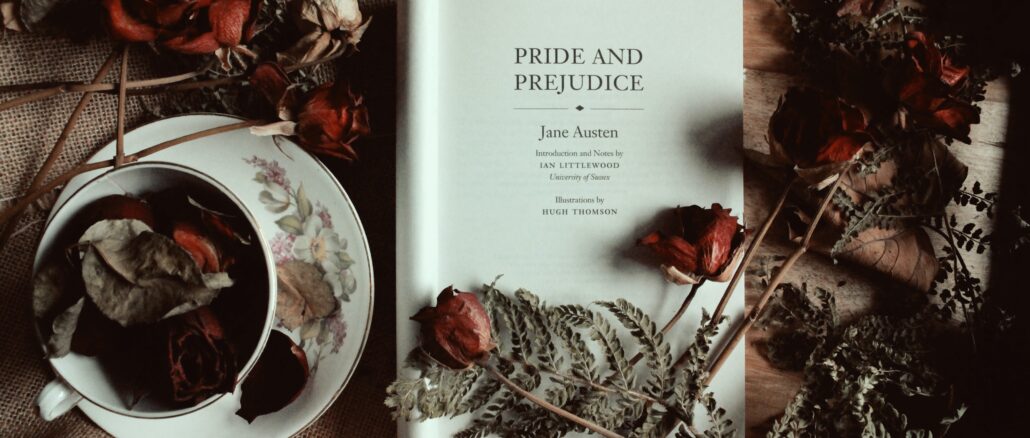
Another world and time, embedded with severe and consequential social strictures of class, gender and social connections, gallantly awaits one upon opening the pages of the stellar novel, Pride and Prejudice. For those not familiar with this book’s title or it’s illustrious English author, Jane Austen, from it’s publication in the Regency Period (specifically 1813), Pride and Prejudice has been read and beloved by millions and analysed and commented upon endlessly in the ensuing centuries by readers and scholars around the world. In short, it is universally loved and dwelt on.
Set in the sublimely atmospheric and lush English countryside some time between the late 1700s and early 1800s (Jane refers to military regiments in the book that would connect with the Napoleonic Wars), the novel’s chief protagonist is the highly intelligent, outspoken and headstrong Elizabeth Bennet. Elizabeth is in her early twenties and the second of five daughters to Mr and Mrs Bennet. Jane, the eldest is exceedingly beautiful and demure, Mary is studious and serious, while teenagers Kitty and Lydia are flighty and somewhat irresponsible.
Mr Bennet is a country gentleman who is well connected socially and by birth (important in British society at the time, and one could argue still is to a considerable degree in today’s British social circles), but is however not terribly well off financially. Despite their diminished financial affairs, the Bennets employ devoted servants at their residence in Longbourn in the county of Hertfordshire. There is but one way for Mrs Bennet and her daughters to survive financially if Mr Bennet should pass away (his property would have to go to a male nephew, William Collins), and that is for the Bennet daughters to marry “well”.
When Mrs Bennet gets wind of the fact that the handsome and highly eligible bachelor Mr Charles Bingley has taken up residence in the nearby Netherfield estate, she is all of a considerable flutter. Mrs Bennets’ chief motivator in life is for all of her daughters to be married off, and the better off financially and of a certain upper class the girls’ future husbands are, the better. As Mrs Bennet beseeches Mr Bennet regarding Mr Bingley, “..it is very likely that he may fall in love with one of them (the Bennet daughters), and therefore you must visit him”.
Mr Bingley has a friend, the sullen and proud (or so it appears) and incredibly dashing, Mr Fitzwilliam Darcy, owner of an estate in Derbyshire known as Pemberly. Mr Darcy is of the aristocratic class, and seems to be profoundly conscious of this fact.
At a ball attended by Elizabeth and Jane Bennet, Mr Bingley finds himself besotted with Jane, while Elizabeth finds herself repulsed and infuriated by Mr Darcy. Unknown to Elizabeth, Mr Darcy becomes enamoured of her, and when eventually, down the track,he proposes marriage to her, she swiftly and deftly declines.
Mr Bingley departs for London, and Jane is left to wonder if there is any hope for them to be together, for she has fallen irrevocably under his spell.
When Lydia, at sixteen, runs off with the cad-like and debt-ridden Lieutenant George Wickham to London (with Mr Wickham seeming to have no intent of marrying her), the Bennet family are shocked, scandalised and full of angst, Mrs Bennet taking herself to bed.
Is there any hope for Elizabeth and Mr Darcy to ever be married? Will Elizabeth forever be hostile to Mr Darcy and judgemental of him? What of Mr Darcy’s interfering aunt, Lady Catherine de Bourgh?
Will Mr Bingley break Jane’s heart and never return to her from London?
Will the Bennets be put to shame in their social circles by Lydia’s recklessness and impudence in ‘shacking up’ with Wickham? (remember this is the late 1700s/early 1800s in England!).
Will the Bennet sisters all be married off and to whom?
Brilliance, intelligence, wisdom and keen powers of observation into what contrived the British class system and gender roles in the early nineteenth century shine on every page of this phenomenally well constructed and excellently paced book. Additionally, the character development is supreme and second to none.
From a purely historical point of view, Jane’s writing is pure gold, as it is written by one who actually occupied the world of the socially ‘fine’ at that time. Although Jane’s family were not overly wealthy (her father was a clergyman), they were still well connected.
Jane exhibits resolutely that she has a deep insight into love (romantic, friendship and family love). Jane never married, although there has been speculation that she had love interests in her brief life. She passed away in 1817 at the age of forty-one from an unknown illness.
If Jane were alive today, I would thank her unreservedly for writing such an exquisite book of classical English literature. I am sure I would join a veritable mountain of readers in those remarks.
Thank you so much Jane. You have given me and so many others a great deal of joy and insight into a time and place in history that will never be forgotten because of your fine work.
Hardcover – Pride and Prejudice by Jane Austin
Kindle – Pride and Prejudice by Jane Austin
Complete Works of Jane Austen (Boxed Set)
Editor’s Note: SheSociety would like to disclose as an Amazon Associate we earn from qualifying purchases.
SheSociety is a site for the women of Australia to share our stories, our experiences, shared learnings and opportunities to connect.

Leave a Reply